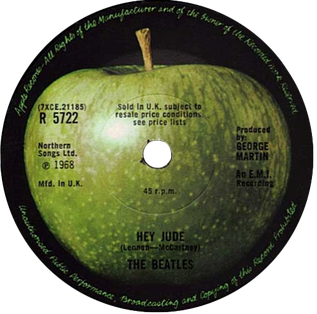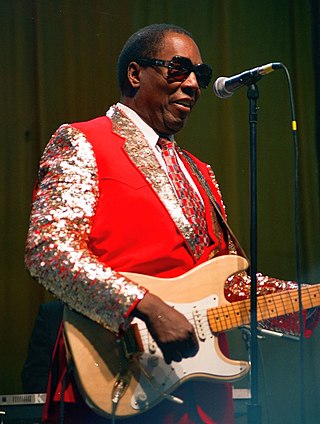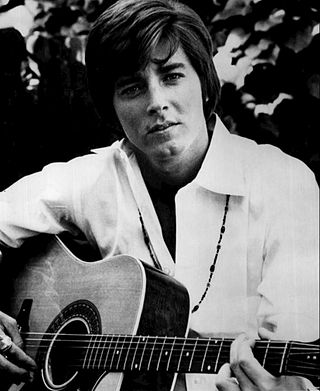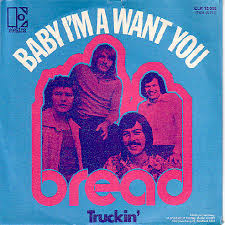Related Research Articles

"Hey Jude" is a song by the English rock band the Beatles that was released as a non-album single in August 1968. It was written by Paul McCartney and credited to the Lennon–McCartney partnership. The single was the Beatles' first release on their Apple record label and one of the "First Four" singles by Apple's roster of artists, marking the label's public launch. "Hey Jude" was a number-one hit in many countries around the world and became the year's top-selling single in the UK, the US, Australia and Canada. Its nine-week run at number one on the Billboard Hot 100 tied the all-time record in 1968 for the longest run at the top of the US charts, a record it held for nine years. It has sold approximately eight million copies and is frequently included on music critics' lists of the greatest songs of all time.

Mary Hopkin, credited on some recordings as Mary Visconti from her marriage to Tony Visconti, is a Welsh singer best known for her 1968 UK number 1 single "Those Were the Days". She was one of the first artists to be signed to the Beatles' Apple label.

Clarence George Carter is an American singer, songwriter, musician and record producer. His most successful songs include "Slip Away", "Back Door Santa", "Patches" (1970) and "Strokin'" (1986).

Robert Cabot Sherman Jr. is an American singer and actor who was a teen idol in the late 1960s and early 1970s. He had a series of successful singles, notably the million-seller "Little Woman" (1969). Sherman left show business in the 1970s for a career as a paramedic and a deputy sheriff, but performed occasionally into the 1990s.
The Flirtations are an all-female musical group who have recorded since the early 1960s.
The Vibrations were an American soul vocal group from Los Angeles, California, active from the mid-1950s to 1976. Most notable among the group's hit singles were "My Girl Sloopy" (1964) and "Love in Them There Hills" (1968). They also had a hit with the up-tempo song “Surprise party for baby” (1971) in the UK on the Northern Soul scene. The quintet's members included Don Bradley, Carl Fisher, Dave Govan, James Johnson and Ricky Owens.

The Lettermen are an American male pop vocal trio whose trademark is close-harmony pop songs with light arrangements. The group started in 1959. They have had two Top 10 singles, 16 Top 10 singles on the Adult Contemporary chart, 32 consecutive Billboard chart albums, 11 gold records, and five Grammy nominations.

Elvis Now is the sixteenth studio album by American singer Elvis Presley, released in February 1972. The album entered Billboard on February 12, and reached No. 43. The only single from the album, "Until It's Time for You to Go" / "We Can Make the Morning" reached number 9 on the Easy Listening chart in the US in March 1972 and number 5 on the UK Singles Chart in April 1972. The album was certified Gold on March 27, 1992, by the RIAA. "Sylvia" became a hit for Presley in Brazil in the 1970s.

"Your Song" is a song written by musician Elton John and lyricist Bernie Taupin, and performed by John. It was John's first international Top 10 chart single.

"Proud Mary" is a song by American rock band Creedence Clearwater Revival, written by vocalist and lead guitarist John Fogerty. It was released as a single in January 1969 by Fantasy Records and on the band's second studio album, Bayou Country. The song became a major hit in the United States, peaking at No. 2 on the Billboard Hot 100 in March 1969, the first of five singles to peak at No. 2 for the group.

"Na Na Hey Hey Kiss Him Goodbye" is a 1969 song written and recorded by Paul Leka, Gary DeCarlo and Dale Frashuer, attributed to a then-fictitious band Steam. It was released under the Mercury subsidiary label Fontana and became a number-one pop single on the Billboard Hot 100 in late 1969, and remained on the charts in early 1970.

"Vincent" is a song by Don McLean, written as a tribute to Vincent van Gogh. It is often erroneously titled after its opening refrain, "Starry, Starry Night", a reference to Van Gogh's 1889 painting The Starry Night.

"This Christmas" is a song by American soul musician Donny Hathaway released in 1970 by Atco Records. The song gained renewed popularity when it was included in 1991 on Atco Records' revised edition of their 1968 Soul Christmas compilation album and has since become a modern Christmas standard, with the American Society of Composers, Authors and Publishers reporting that it was the 30th most-performed holiday song of all time.
"River" is a song by Canadian singer songwriter Joni Mitchell, from her 1971 album Blue. Written on piano, it has become a standard for artists in many music styles, and has become popular as Christmas music. Although never released as a single, "River" holds second place among Mitchell's songs most recorded by other artists. In 2021, it was ranked at No. 247 on Rolling Stone's "Top 500 Best Songs of All Time".
"When I'm Dead and Gone" is a song written by Benny Gallagher and Graham Lyle, released as a single in 1971, on the Capitol label, by McGuinness Flint.

"Spinning Wheel" is a song from 1968 by the band Blood, Sweat & Tears, written by Canadian lead vocalist David Clayton-Thomas and appearing on their eponymous album.

"Baby I'm-a Want You" is a song by American soft rock band Bread. The single was released in October 1971 and became the title track for the album of the same name, released in January 1972.
Benjamin James Peters was an American country music songwriter who wrote many #1 songs. Charley Pride recorded 68 of his songs and 6 of them went to #1 on the American country charts. Peters was inducted into the Nashville Songwriters Hall of Fame in 1980.
"Santa Claus Is Definitely Here to Stay" is a Christmas song recorded by James Brown. Released in 1970 as a single, it also appeared on the album Hey America.
"Hey Baby (New Rising Sun)" or simply "Hey Baby" is a song written and recorded by American musician Jimi Hendrix, from his second posthumous album Rainbow Bridge (1971). The song is a slower and more melodic piece, which features the prominent use of chorus- and tremolo-effects on guitar. Hendrix uses an idealized feminine figure that recurs in several of his lyrics. Commentators have seen the song as representative of his post-Band of Gypsys musical direction.
References
- ↑ White, Cliff (1991). "Discography". In Star Time (pp. 54–59) [CD booklet]. New York: PolyGram Records.
- ↑ "Hey America (song by James Brown) ••• Music VF, US & UK hits charts". Musicvf.com. 1971-11-27. Retrieved 2016-10-03.
- ↑ "James Brown – "Hey America" (1970) SPIN".